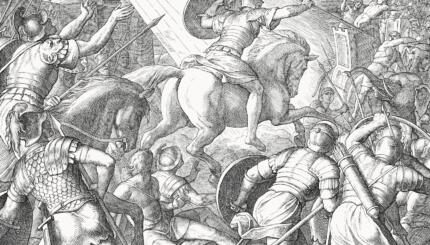Spirituality is biography. Jewish spirituality and Jewish biography both demand a duty to speak out, reject silencing, and stand up against any power that would silence another. Such is the call of Hanukkah and this moment of meaning for Jewish life.
I come with skin in the game. As a judicial officer, my state’s judicial ethics code bans me from making most public statements about partisan politics. In these weeks after the 2016 election, congregants in my rabbinic capacity (and lawyers and litigants in my judicial capacity) feel and say much about the election outcome – but ethically I can’t directly engage. That’s how it should be: Judicially it’s vital that all feel like they get a fair shake, and rabbinically it’s vital that all feel welcome, regardless of partisan politics. The effect is to silence me.
I reflected on my silencing, feeling stifled by role ethics. And that’s when it hit me. What could I possibly know about what it really means to be silenced? I’m an able-bodied male facing no prejudice of a visible minority. I live in safe suburbia, reaping the privilege of a top-notch education. I’m a judicial officer, pulpit rabbi and Jewish movement leader: disempowerment isn’t my problem. So if I feel “silenced,” then how might real silencing feel to a domestic violence victim unsafe at home? An African American? A Muslim American? An undocumented immigrant in modern America? Vast swaths of America that felt or feel politically unseen and unheard?
Silencing is a crisis of spirit, and I don’t know the half of it – but my Jewish ancestors did. Some were murdered in the Holocaust, silenced to death. Others were born female at a time, not too long ago, when some men imagined that women didn’t “need” a Jewish education and couldn’t become Jewish teachers and leaders. Centuries of Jews faced official silencing, bans, civic disqualification, exile and more.
It’s no wonder that Judaism’s core trope of liberation theology is the biography-becomes-spirituality journey from silencing to speech – from slavery to freedom (Passover), concealment to revelation (Purim), discrimination to empowerment (Hanukkah). As Hanukkah’s populist story recounts, Jews have known the darkness of being silenced into submission. It’s a core Jewish calling, and a core human calling, to bring that kind of darkness into light.
As Jews have known silencing, we have a special duty to speak out and stand up. It’s one of many reasons I believe that Jews must stand up against any registration of Muslims in America, against anything and anyone that would silence others into submission. If everyone is b’tzelem Elohim, crafted equally in the image of divinity (Genesis 1:27), then everyone has a divine right – even a divine duty – to speak and stand up. Thus, political speech is as much a spiritual act as a political one. It’s why Elie Wiesel’s 1986 speech accepting the Nobel Peace Prize put it this way:
I swore never to be silent whenever and wherever human beings endure suffering and humiliation. We must always take sides. Neutrality helps the oppressor, never the victim. Silence encourages the tormentor, never the tormented. Sometimes we must interfere. When human lives are endangered, when human dignity is in jeopardy, national borders and sensitivities become irrelevant. Wherever men or women are persecuted because of their race, religion, or political views, that place must – at that moment – become the center of the universe.
This Hanukkah, light the candles – but don’t stop there. Speak out. Find a cause and stand up. Let nobody be silenced into submission. Let nobody be silenced into being less than the holy spark that lights every human soul. Let that ethic be the center of our universe – and the ballast of our Jewish lives.
trope
Pronounced: TROPE, Origin: Yiddish, notations indicating the tune for chanting the Torah portion or other biblical text.



